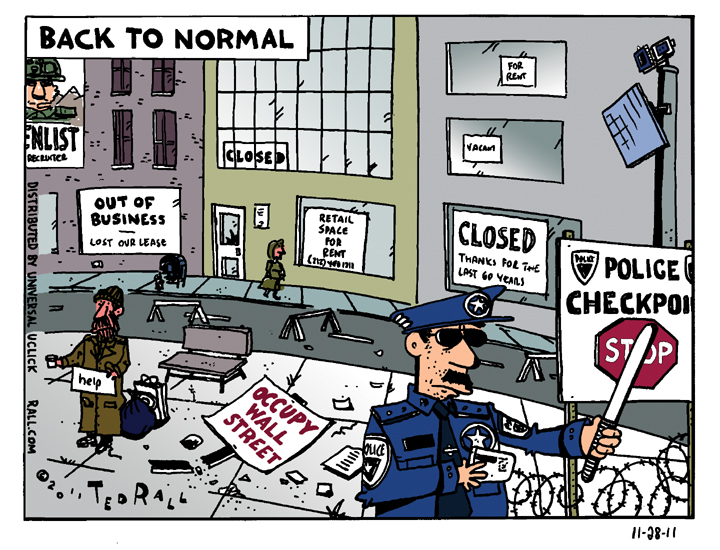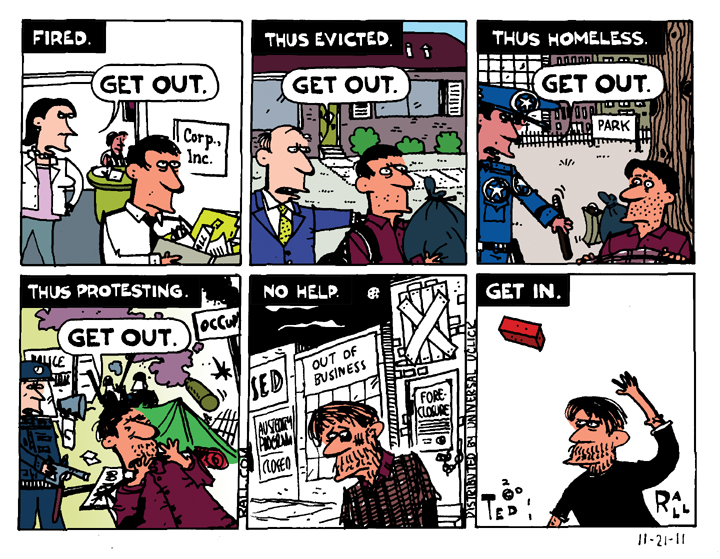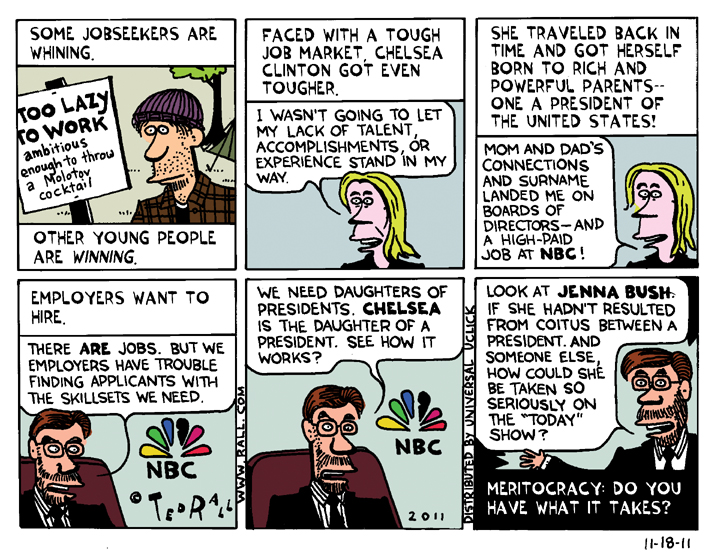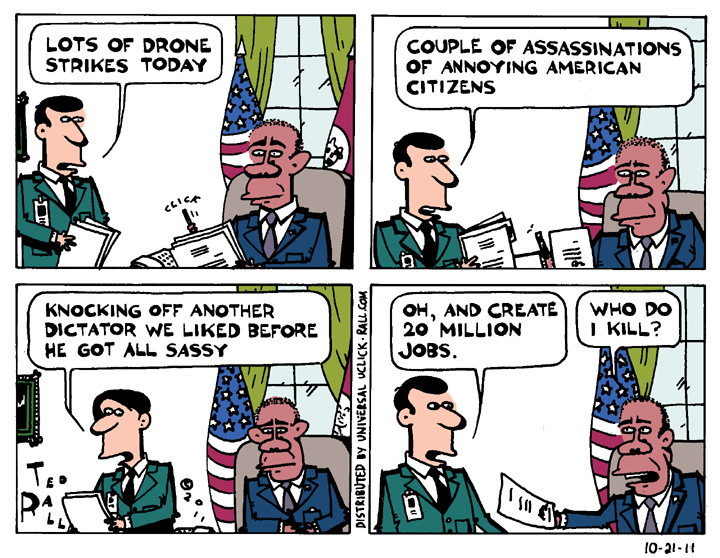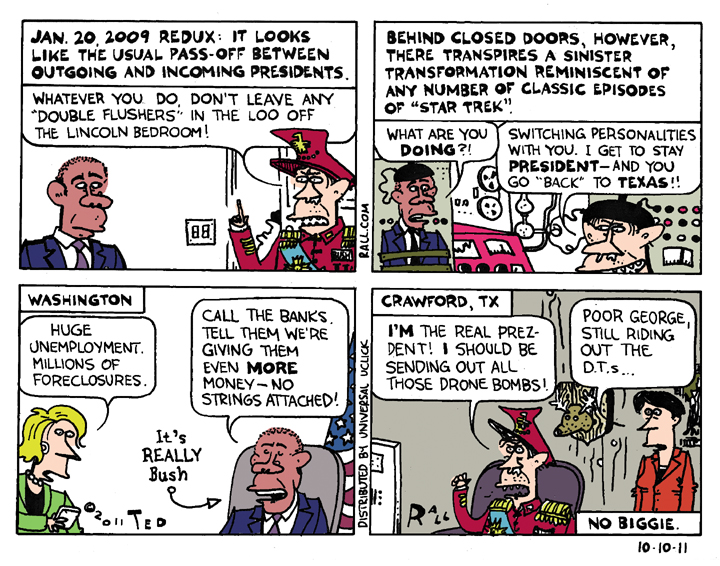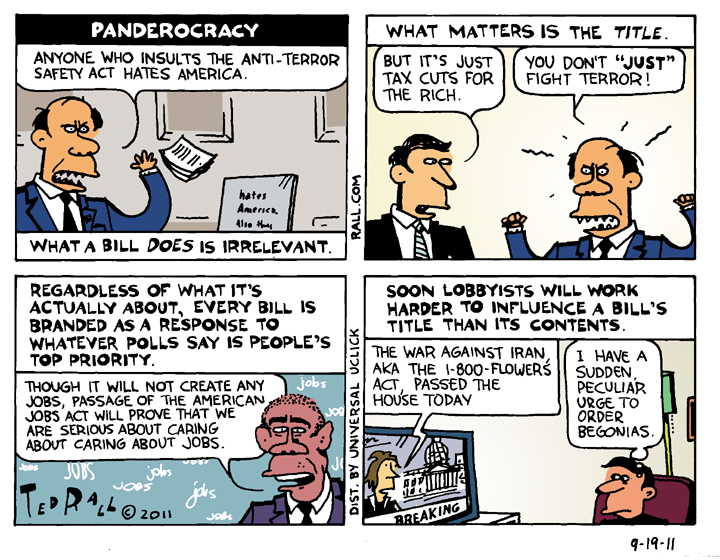Some people celebrate as Occupy Wall Street is evicted from Zuccotti Park.
SYNDICATED COLUMN: Quit Whining About Student Loans
Time for #OWS to Broaden Its Appeal
It has been 30 days since Occupy Wall Street began. The movement hasn’t shaken the world à la John Reed—not yet—but at one thousand occupations and counting, it can’t be ignored.
OWS has become so impressive, so fast, that it’s easy to forget its half-assed origin. No matter. The fact that the French Revolution was partly set off by the drunken ravings of the Marquis de Sade hardly reduces its importance.
Soon the Occupiers will have to face down a number of practical challenges. Like weather. Winter is coming. Unless they move indoors, campers at Occupy Minneapolis and Occupy Chicago will suffer attrition. But indoor space is private property. So confrontation with the police seems inevitable.
As I saw at STM/Occupy DC, there is an ideological split between revolutionaries and reformists. Typical of the reformists: This week OWSers urged sympathizers to close their accounts with big banks like Citibank and Bank of America and move their savings to credit unions and local savings and loans. If revolutionaries get their way, there will be no banks. Or one, owned by the people.
There is no immediate rush, nor should there be, to issue demands. The horizontal democracy format of the Occupy movement’s General Assemblies is less about getting things done than giving voices to the voiceless. For most citizens, who have been shut out of politics by the fake two-party democracy and the corporate media, simply talking and being heard is an act of liberation. At some point down the road, however, the movement will come to a big ideological fork: do they try to fix the system? Or tear it down?
The Occupiers don’t have to choose between reformism and revolution right away—but they can’t wait too long. You can’t make coherent demands until you can frame them into a consistent narrative. What you ultimately want determines what you ask for in the time being—and how you ask for it.
Trotsky argued for the issuance of “transitional demands” in order to expose the uncompromising, unjust and oppressive nature of the regime. Once again, an “epoch of progressive capitalism” (reformism, the New Deal, Great Society, etc.) has ended in the United States and the West. Thus “every serious demand of the proletariat” de facto goes further than what the capitalist class and its bourgeois state can concede. Transitional demands would be a logical starting point for an Occupy movement with a long-term revolutionary strategy.
Both routes entail risk. If the Occupiers choose the bold path of revolution, they will alienate moderates and liberals. The state will become more repressive.
On the other hand, reformism is naïve. The system is plainly broken beyond repair. Trying to push for legislation and working with establishment progressives will inevitably lead to cooption, absorption by big-money Democrats and their liberal allies, and irrelevance. (Just like what happened to the Tea Party, a populist movement subsumed into the GOP.)
Revolution means violence in the streets. Reform means failure, and the continued, slow-grinding violence by the corporate state: poverty, repression, injustice.
At this point, job one for the movement is to grow.
I don’t mean more Facebook pages or adding more cities. The day-to-day occupations on the ground need to get bigger, fast. The bigger the occupations, the harder they will be for the police to dislodge with violent tactics.
More than 42 percent of Americans do not work. Not even part-time. Tens of millions of people, with free time and nothing better to do, are watching the news about the Occupy movement. They aren’t yet participating. The Occupiers must convince many of these non-participants to join them.
Why aren’t more unemployed, underemployed, uninsured and generally screwed-over Americans joining the Occupy movement? The Los Angeles Times quoted Jeff Yeargain, who watched “with apparent contempt” 500 members of Occupy Orange County marching in Irvine. “They just want something for nothing,” Yeargain said.
I’m not surprised some people feel that way. Americans have a strong independent streak. We value self-reliance.
Still, there is something the protesters can and must do. They should make it clear that they aren’t just fighting for themselves. That they are fighting for EVERYONE in “the 99 percent” who aren’t represented by the two major parties and their compliant media.
OWSers must broaden their appeal.
Many of the Occupiers are in their 20s. The media often quotes them complaining about their student loans. They’re right to be angry. Young people were told they couldn’t get a job without a college degree; they were told they couldn’t get a degree without going into debt. Now there are no jobs, yet they still have to pay. They can’t even get out of them by declaring bankruptcy. They were lied to.
But it’s not about them. It’s about us.
The big point is: Education is a basic right.
Here is an example of how OWSers could broaden their appeal on one issue. Rather than complain about their own student loans, they ought to demand that everyone who ever took out and repaid a student loan get a rebate. Because it’s not just Gen Y who got hosed by America’s for-profit system of higher education. So did Gen X and the Boomers.
No one will support a movement of the selfish and self-interested.
The Freedom Riders won nobility points because they were white people willing to risk murder to fight for black people. Occupiers: stop whining about the fact that you can’t find a job. Fight for everyone’s right to earn a living.
The Occupy movement will expand when it appeals to tens of millions of ordinary people sitting in homes for which they can’t pay the rent or the mortgage. People with no jobs. Occupy needs those men and women to look at the Occupiers on TV and think to themselves: “They’re fighting for ME. Unless I join them, they might fail.”
The most pressing issues for most Americans are (the lack of) jobs, the (crappy) economy and growing income inequality. The foreclosure and eviction crisis is also huge. OWS has addressed these issues. But OWS has not yet made the case to the folks watching on TV that they’re focused like a laser.
It takes time to create jobs. But the jobless need help now. The Occupy movement should demand immediate government payments to the un- and underemployed. All foreclosures are immoral; all of them ruin neighborhoods. The Occupy movement should demand that everyone—not just victims of illegal foreclosures—be allowed back into their former homes, or given new ones.
For the first time in 40 years, we have the chance to change everything. To end gangster capitalism. To jail the corporate and political criminals who have ruined our lives. To save what’s left of our planet.
The movement must grow.
Nothing matters more.
(Ted Rall is the author of “The Anti-American Manifesto.” His website is tedrall.com.)
COPYRIGHT 2011 TED RALL
SYNDICATED COLUMN: Ah, To Be Young And In Hate
America’s New Radicals Attack a System That Ignores Them
“Enraged young people,” The New York Times worries aloud, are kicking off the dust of phony democracy, in which “the job of a citizen was limited to occasional trips to the polling places to vote” while decision-making remains in the claws of a rarified elite of overpaid corporate executives and their corrupt pet politicians.
“From South Asia to the heartland of Europe and now even to Wall Street,” the paper continues, “these protesters share something else: wariness, even contempt, toward traditional politicians and the democratic political process they preside over. They are taking to the streets, in part, because they have little faith in the ballot box.”
The rage of the young is real. It is justified. It is just beginning to play out.
The political class thinks it can ignore the people it purports to represent. They’re right–but not forever. A reckoning is at hand. Forty years of elections without politics will cost them.
Americans’ pent-up demand for a forum to express their disgust is so vast that they are embracing slapdash movements like Occupy Wall Street, which reverses the traditional tactic of organizing for a demonstration. People are protesting first, then organizing, then coming up with demands. They have no other choice. With no organized Left in the U.S., disaffected people are being forced to build resistance from the ground up.
Who can blame young adults for rejecting the system? The political issue people care most about–jobs and the economy–prompts no real action from the political elite. Even their lip service is half-assed. Liberals know “green jobs” can’t replace 14 million lost jobs; conservatives aren’t stupid enough to think tax cuts for the rich will help them pay this month’s bills.
The politicians’ only real action is counterproductive; austerity and bank bailouts that hurt the economy. Is the government evil or incompetent? Does it matter?
Here in the United States, no one should be surprised that young adults are among the nation’s angriest and most alienated citizens. No other group has been as systematically ignored by the mainstream political class as the young. What’s shocking is that it took so long for them to take to the streets.
Every other age groups get government benefits. The elderly get a prescription drug plan. Even Republicans who want to slash Medicaid and Medicare take pains to promise seniors that their benefits will be grandfathered in. Kids get taken care of too. They get free public education. ObamaCare’s first step was to facilitate coverage for children under 18.
Young adults get debt.
The troubles of young adults get no play in Washington. Pundits don’t bother to debate issues that concerns people in their 20s and 30s. Recent college graduates, staggering under soaring student loan debt, are getting crushed by 80 percent unemployment–and no one even pretends to care. Young Americans tell pollsters that their top concerns are divorce, which leaves kids impoverished, and global warming. Like jobs, these issues aren’t on anyone’s agenda.
This pot has been boiling for decades.
In 1996 I published “Revenge of the Latchkey Kids,” a manifesto decrying the political system’s neglect and exploitation of Generation X, my age cohort, which followed the Baby Boomers.
We were in our 20s and low 30s at the time.
Un- and underemployment, the insanity of a job market that requires kids to take out mortgage-sized loans to attend college just to be considered for a low-paid entry-level gig in a cube farm, the financial and emotional toll of disintegrating families, and our fear that the natural world was being destroyed left many of my peers feeling resentful and left out–like arriving at a party after the last beer was gone.
Today the oldest Gen Xers are turning 50. Life will always be harder for us than it was for the Boomers. If I had to write “Latchkey Kids” for today’s recent college grads, it would be bleaker still. Today’s kids–demographers call them Gen Y–have it significantly worse than we did.
Like us, today’s young adults get no play from the politicians.
The debts of today’s Gen Yers are bigger ($26,000 in average student loans, up from $10,000 in 1985). Their incomes are smaller. Their sense of betrayal, having gone all in for Obama, is deeper.
Young adults turned out big for Obama in 2008, but he didn’t deliver for them. They noticed: The One’s approval rating has plunged from 75 percent among voters ages 18-29 when he took office in January 2009 to 45 percent in September.
Politicians like Obama ignore young adults, especially those with college degrees, at their–and the system’s–peril. Now, however, more is at stake than Obama and the Democrats’ 2012 election prospects. The entire economic, social and political order faces collapse; young people may choose revolution rather than accept a life of poverty in a state dedicated only to feeding the bank accounts of the superrich.
As Crane Brinton pointed out in his seminal book “The Anatomy of Revolution,” an important predictor of revolution is downward mobility among strivers, young adults whose education and ambition would traditionally have led to a brighter future.
In February Martin Wolf theorized in The Financial Times that the Arab Spring rebellions in Egypt and Tunisia owed their success to demographics; those countries have more young people than old ones. On the other hand “middle-aged and elderly rig political and economic life for their benefit in the U.K. [he could also have said the U.S.]: hence the way in which policies on housing or education finance are weighted against the young.”
Right here and right now, though, the young and the old are on the same side. Though the young are getting screwed the hardest, almost everyone else is getting screwed too. And with 80 percent unemployment, the young have a lot of free time to rise up.
(Ted Rall is the author of “The Anti-American Manifesto.” His website is tedrall.com.)
COPYRIGHT 2011 TED RALL
SYNDICATED COLUMN: Occupy Main Street
For America’s New Radicals, a Coming-Out Party—and Brutal Cops
“First they ignore you, then they ridicule you, then they fight you, then you win.” —Gandhi
Gandhi lost, but never mind.
#OccupyWallStreet, in its second week as of this writing, is and was important. It is the first major street protest inspired by the economic collapse that began in 2008. It is also the first notable public repudiation of Obama by the American Left. Inspired by the Arab Spring, the Canadian “culture jammer” magazine Adbusters asked people to converge on lower Manhattan’s financial district in order to protest corporate greed in general and—in a reflection of the influence of social networking culture—to develop one specific major demand after they gathered.
Several thousand people arrived 10 days ago but were turned away from Wall Street by a phalanx of NYPD officers manning metal barricades. A few hundred demonstrators, dominated by the scruffy white twentysomething college grads known as “hipsters,” wound up at Zuccotti Park, whose private owners granted them permission to camp there.
There they remain, noshing on donated pizza, talking, hanging out, hoping to replicate the magic of Cairo’s Tahrir Square while remaining committed to “absolute nonviolence in the Gandhian tradition,” as Adbusters commanded.
Occupy Wall Street now seems to be fizzling out.
For me and other older, jaded veterans of leftist struggle, failure was a foregone conclusion. From the opening words of the magazine’s updates to the participants, which it referred to as “dreamers, jammers, rabble-rousers and revolutionaries,” it was evident that yet another opportunity to agitate for real change was being wasted by well-meant wankers.
Michael Moore complained about insufficient media coverage, but this non-movement movement was doomed before it began by its refusal to coalesce around a powerful message, its failure to organize and involve the actual victims of Wall Street’s perfidy (people of color, the poor, the evicted, the unemployed, those sick from pollution, etc.), and its refusal to argue and appeal on behalf of a beleaguered working class against an arrogant, violent and unaccountable ruling elite—in other words, to settle for nothing less than the eradication of capitalism.
Don’t just occupy Wall Street.
Occupy Main Street. Get ordinary people interested and involved. After all, college kid, it’s not just your struggle.
While a lack of political education should not preclude a person from participating in politics, organizers of a movement seeking radical change should make sure they don’t waste the whole time strumming a guitar and flirting. Zuccotti Park should have offered daily classes and study groups to reduce the odds that an attendee will sound like a moron when she gets questioned by a journalist.
“I’m not for interference [with wealthy people],” The New York Times quoted protester Anna Sluka. “I hope this all gets people who have a lot to think: I’m not going to go to Barcelona for three weeks. I’m going to sponsor a small town in need.” Earth to Anna: Rich people know poor people are suffering. They don’t care.
Also, lose the clown clothes. It’s not the early 1960s; you don’t have to wear a suit like the civil rights marchers did. But how about showing up on national TV looking decent, like it’s Casual Friday?
Revolutionaries should not expect fair coverage by media outlets owned by the transnational corporations they hope to overthrow. They also shouldn’t make themselves so easy to mock. Press accounts reveled in photos of topless women and the dudes on stilts who always show up at these things. So much bad hair, so many colors that don’t occur in nature.
A protest is a stage. All over New York City and around the country, people are watching on TV. Ideally, you want viewers to drop what they’re doing, to come join you. At bare minimum, you want them to approve of you. To identify with you. Maybe even send a check.
You say you represent the “99 percent” of Americans getting screwed by the top one percent. So act like the 99 percent. Dress like them.
Be normal, inclusive and welcoming.
Reporters quoted demonstrators who sounded as ignorant about current affairs as members of the Tea Party, albeit nicer. It was a perfect set-up for hit pieces by the likes of Ginia Bellafante, who called the downtown gathering an “opportunity to air societal grievances as carnival” and slammed the “group’s lack of cohesion and its apparent wish to pantomime progressivism rather than practice it knowledgably.”
History has proven that an absolute commitment to nonviolence can never effect radical change. This was shown again on Saturday September 23rd, when police used orange plastic nets to “kettle” and arrest about 80 Occupy Wall Streeters who had been marching peacefully through Greenwich Village. According to numerous witnesses and media accounts, none resisted. Cops went wild, beating several men bloody and macing at least one woman after she had been cuffed.
Sadly, too many people angry at gangster capitalists will look at the YouTube videos of bloodied young faces and say to themselves: I’m willing to suffer for a cause, not a scene.
Back in July, Adbusters wanted the “one simple demand” expressed by Occupy Wall Street to be “that Barack Obama ordain a Presidential Commission tasked with ending the influence money has over our representatives in Washington.”
What do we want?
A bipartisan blue-ribbon commission to study the extension of campaign finance reform!
When do we want it?
As soon as the committee completes its work!
Unsurprisingly and rightly, that uninspiring (and easily satisfied) demand has been set aside in favor of something better but hardly worth taking a rubber bullet for: “a vague but certain notion that the richest percentile of the country remains fat and happy as the going-on-five-year-old recession continues to batter the middle and working class,” as The New York Observer put it.
Occupy Wall Street should have demanded something majestic, reasonable and unobtainable, in order to expose the brutal nature of the system. Something like the nationalization of all corporations, equal wages for all workers, or the abolition of securities exchanges.
Some organizers also called Occupy Wall Street “Days of Rage”; along with organization and focus, rage is what is lacking.
The aggregated wealth of the superrich has been stolen from the rest of us. We should not ask them to give some of it back. We should take it all, then jail them.
Which isn’t going to happen nonviolently.
Rich people are bad people. Someone has to say it out loud.
I have no problems with the organizers of a protest deciding that its marchers will remain nonviolent. I am speaking at such an event on October 6th. However, I think it’s unwise to broadcast those intentions to the authorities.
Few people think about it now, but street demonstrations have always relied on a sense of menace. Sure, people marching through the streets of a medieval city might begin by expressing their demands peacefully. But they drank beer instead of water. On a hot day, things might escalate into a riot. The local lord was wise to give in earlier rather than later.
The rich and powerful never relinquish their prerogatives voluntarily. Only violence or the credible threat of violence can force them to give up what they stole through violence and corruption.
Despite the protesters’ many missteps, which were inevitable due to their lack of experience and political seasoning, the Occupy Wall Streeters should be commended. Sure, they did some stupid things. But they have taken a first (tentative) step into history. They have learned lessons. Hopefully they will be smarter next time.
See you in Washington on October 6th, when the October 2011 Coalition will begin the occupation of Freedom Square near the White House. Our demand is simple: We will not leave until the last occupation soldier and mercenary is withdrawn from U.S.-occupied Afghanistan.
(Ted Rall is the author of “The Anti-American Manifesto.” His website is tedrall.com.)
COPYRIGHT 2011 TED RALL

